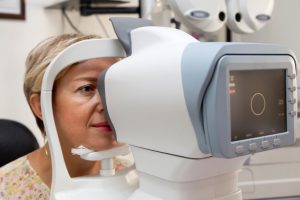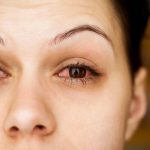 Ocular hypertension means the pressure in your eyes (intraocular pressure) is higher than it should be – if left untreated it could cause glaucoma and vision loss. This is why having your eye pressure measured during regular eye exams is so important.
Ocular hypertension means the pressure in your eyes (intraocular pressure) is higher than it should be – if left untreated it could cause glaucoma and vision loss. This is why having your eye pressure measured during regular eye exams is so important.
According to one ocular hypertension study, between 4.5 and 9.4 Americans aged 40 or older have ocular hypertension, which increases their risk of developing glaucoma. Glaucoma threatens sight. It is interesting to note that some people can have an abnormal eye pressure without experiencing vision loss, while others suffer significant vision damage.
Advertisement
Normal intraocular pressure is considered a measurement of less than 21 mm Hg, yet this upper limit can vary in different populations.
It is important to distinguish that ocular hypertension isn’t the same thing as glaucoma. Glaucoma is a disease that is often caused by high intraocular pressure. People with ocular hypertension can appear to have normal optic nerves and no signs of glaucoma during a visual field test, but are still considered “glaucoma suspects”. This essentially means that they need to be regularly monitored by an ophthalmologist to make sure that glaucoma doesn’t develop.
Intraocular pressure rises with age, just like glaucoma becomes more prevalent as we age.
Ocular hypertension causes
When it comes to ocular hypertension causes, a number of different factors could be involved. Some of the same factors also contribute to the development of glaucoma.
Here are the main contributing factors to ocular hypertension:
- Eye trauma – an injury to the eye can impact aqueous production (clear fluid in the eye).
- Excessive aqueous production – the clear fluid produced in the ciliary body, which is behind the iris, overflows, filling the pupil and anterior chamber of the eye. This creates pressure in the eye.
- Inadequate aqueous drainage – when aqueous drains too slowly, it can cause high pressure to the eye.
- Medications – certain drugs can cause ocular hypertension. For example, steroids increase the risk of high eye pressure.
- Other eye conditions – eye pressure problems have been linked to many other eye conditions, including pigment dispersion syndrome and corneal arcus.
- Race/Family history – African Americans and those with a family history of ocular hypertension are at greater risk.
- Diabetics – having diabetes increases the risk of eye problems.
- High myopia – being very nearsighted.
Medical researchers have also discovered that people who have a thinner than normal central cornea may be at a greater risk for ocular hypertension and glaucoma. Studies also estimate that between three and six million Americans have intraocular pressure of 21 mm Hg or higher, but have no signs of glaucoma damage thus far.
As research points out, ocular hypertension is 10 to 15 times more likely to happen than “primary open-angle glaucoma,” which is the most common form of glaucoma. This means that out of every one hundred people over the age of 40, approximately 10 will have high eye pressure, but only one of those people will have glaucoma as well.
Ocular hypertension symptoms
 So you might be wondering, how a person knows if they have a problem with their eye pressure. There really aren’t any obvious ocular hypertension symptoms. Some eye issues cause outward signs like eye redness, puffiness, watering, or even pain, but in this case the only way to know whether your eye pressure is good or bad is through an eye exam. An eye care professional will measure your eye pressure and compare it with normal levels.
So you might be wondering, how a person knows if they have a problem with their eye pressure. There really aren’t any obvious ocular hypertension symptoms. Some eye issues cause outward signs like eye redness, puffiness, watering, or even pain, but in this case the only way to know whether your eye pressure is good or bad is through an eye exam. An eye care professional will measure your eye pressure and compare it with normal levels.
When we picture our eyes as a globe inflated by pressure, it is easier to understand why they should be monitored. Too much pressure exerts force within the eye interior, potentially damaging delicate optic nerves.
Ocular hypertension diagnosis
There are various tests an ophthalmologist can conduct when confirming a diagnosis of ocular hypertension. A visual field test will check for blank spots in your vision. During a visual field test, a perimeter (patch) will be used to cover one eye at a time, so you can look ahead at a target. A computer makes a noise, and random points of light will flash around a bowl-shaped perimeter. It is your job to press a button whenever you see a light.
Here are a few other tests:
- Tonometry – a procedure to measure the pressure in your eye.
- Gonioscopy – an examination to get a clear look at the drainage angle of your eye.
- Ophthalmoscopy – an inspection of your optic nerve for signs of damage.
- Pachymetry – a test to measure corneal thickness.
While bright lights, eye patches, and eye drops are used during the different examinations, there is no pain involved and no need for sedation.
Treatment options for ocular hypertension
Advertisement
 If you are diagnosed with ocular hypertension, your doctor might not prescribe anything. They may suggest closely monitoring your eye pressure just to make sure it does not progress and you don’t develop glaucoma. In some situations, doctors will prescribe eye drops that can help reduce pressure in the eye. In cases where there is high eye pressure and glaucoma, surgery may be required.
If you are diagnosed with ocular hypertension, your doctor might not prescribe anything. They may suggest closely monitoring your eye pressure just to make sure it does not progress and you don’t develop glaucoma. In some situations, doctors will prescribe eye drops that can help reduce pressure in the eye. In cases where there is high eye pressure and glaucoma, surgery may be required.
Since there is an increased risk of glaucoma with ocular hypertension, you should have your pressure measured at regular intervals recommended by your doctor. Don’t miss appointments.
The eye is a complex and precious organ that can’t withstand excessive pressure. A study conducted by the Centers for Disease Control and Prevention a few years ago showed that many Americans don’t get regular eye exams because they either feel they don’t have any eye problems, can’t afford it, or find getting to the doctor inconvenient, but many healthcare providers point out that a lack of awareness about eye health could end up costing them their vision. If you haven’t had an eye exam in the last 12 to 24 months, you should do so. The majority of people who receive treatment for ocular hypertension do not develop serious vision problems.
